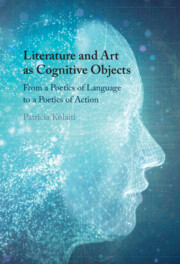Book contents
- Literature and Art as Cognitive Objects
- Literature and Art as Cognitive Objects
- Copyright page
- Contents
- Figures
- Acknowledgements
- Funding
- Additional material
- Introduction
- 1 A Theory of blibs
- 2 What Sort of Concept Literature and Art Is Not
- 3 Literature and Art as an Action
- 4 Literature and Art as a Cognitive and Natural Object
- 5 How to Solve the Ontological Puzzles
- 6 Literature, Art and Relevance
- 7 Ιnterdisciplinary Effects on the Psychology and Neuroscience of Creativity
- Bibliography
- Index
2 - What Sort of Concept Literature and Art Is Not
Published online by Cambridge University Press: 04 September 2025
- Literature and Art as Cognitive Objects
- Literature and Art as Cognitive Objects
- Copyright page
- Contents
- Figures
- Acknowledgements
- Funding
- Additional material
- Introduction
- 1 A Theory of blibs
- 2 What Sort of Concept Literature and Art Is Not
- 3 Literature and Art as an Action
- 4 Literature and Art as a Cognitive and Natural Object
- 5 How to Solve the Ontological Puzzles
- 6 Literature, Art and Relevance
- 7 Ιnterdisciplinary Effects on the Psychology and Neuroscience of Creativity
- Bibliography
- Index
Summary
This chapter offers new arguments against existing accounts of the essence of literature and art. Although these approaches have made significant contributions to understanding key aspects of the literary and art phenomenon, none tells the full story about the essence of art. I show how the last 300 years of discussion on the matter have mainly revolved around artefact-oriented and receiver-oriented approaches and reassess the implications of the collapse of the poetics of language programme, which was inspired by structuralist work in linguistics – particularly Jakobson’s structural-linguistic programme for literature. Drawing on Chomsky’s programme of universal grammar, Fodor’s work on mental modularity and the language of thought, and Sperber and Wilson’s relevance-theory, as well as on a wide array of experimental findings, I argue that there is no distinct capacity for literary language and that the essence of literature does not reside in the language of the literary text. I also correct the misconception that follows from the collapse of the poetics of language that there is no distinct essence of literature/art: literature/art does have an essence, but its essence isn’t a matter of structure. Finally, I consider intellectual precursors of the creator-oriented theory to be developed in this book.
Keywords
Information
- Type
- Chapter
- Information
- Literature and Art as Cognitive ObjectsFrom a Poetics of Language to a Poetics of Action, pp. 28 - 49Publisher: Cambridge University PressPrint publication year: 2025
Accessibility standard: WCAG 2.1 AA
Why this information is here
This section outlines the accessibility features of this content - including support for screen readers, full keyboard navigation and high-contrast display options. This may not be relevant for you.Accessibility Information
Content Navigation
Allows you to navigate directly to chapters, sections, or non‐text items through a linked table of contents, reducing the need for extensive scrolling.
Provides an interactive index, letting you go straight to where a term or subject appears in the text without manual searching.
Reading Order & Textual Equivalents
You will encounter all content (including footnotes, captions, etc.) in a clear, sequential flow, making it easier to follow with assistive tools like screen readers.
You get concise descriptions (for images, charts, or media clips), ensuring you do not miss crucial information when visual or audio elements are not accessible.
You get more than just short alt text: you have comprehensive text equivalents, transcripts, captions, or audio descriptions for substantial non‐text content, which is especially helpful for complex visuals or multimedia.
Visual Accessibility
You will still understand key ideas or prompts without relying solely on colour, which is especially helpful if you have colour vision deficiencies.
Structural and Technical Features
You gain clarity from ARIA (Accessible Rich Internet Applications) roles and attributes, as they help assistive technologies interpret how each part of the content functions.
